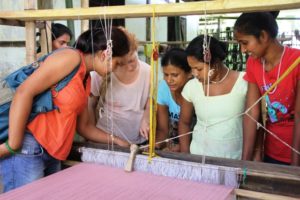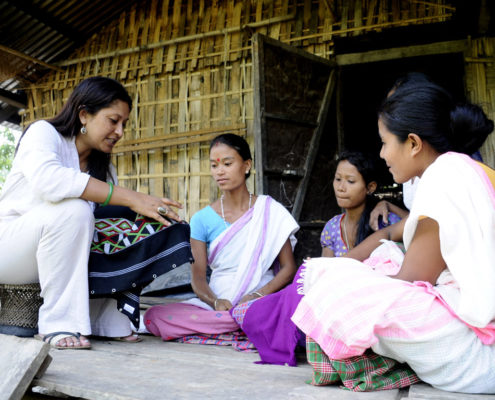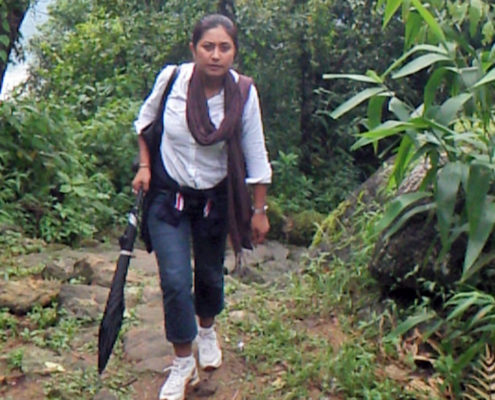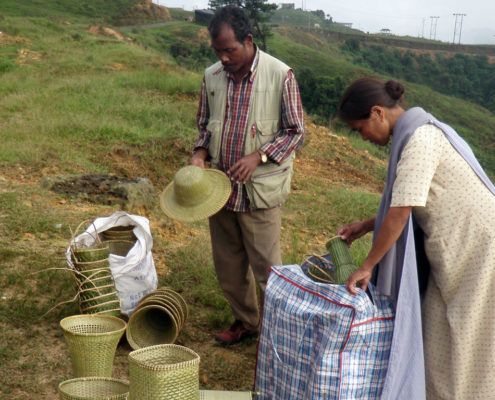Empower – Trade, Not Aid!
People often react to distress through pity and/or aid. But there is another way to enable the distressed community or people to reprise their honour and that is – by empowering them.
Fair trade, as a concept was originally created to fight against slavery by religious organizations through charity. Today, it has radically changed in structure, philosophy and approach.
At Impulse Social Enterprises, we believe in using fair trade to empower artisans (especially women) through business rather than charity. You cannot stop human trafficking, until women at the grassroots, become economically self-sufficient. For a crime such as human trafficking, it can only be at the behest of women that the tide can be turned around. Entrepreneur artisans can produce the handicrafts, thereby earning a fair wage and supporting themselves rather than depending on aid. In short, helping empowerment through Trade, not Aid.
What is Empower
Empower is the artisan brand of Impulse NGO Network’s sister organisation and trade wing, Impulse Social Enterprises (ISE) that creates and sells unique, high quality and handmade products, for the socially conscious buyer.
Launched in 2010, ISE has been engaging women from tribal communities across the Northeast by giving them an income-generating opportunity. Empower is ISE’s new initiative, to develop their entrepreneurial and leadership abilities through greater global interaction. For a geographically challenged region as the Northeast that is threatened acutely by human trafficking, technology is the only immediate bridge that can enable this interaction and create safe economic opportunities. Empower’s e-commerce website, www.impulsempower.com, therefore, proves to be a healthy option for all our artisans.
How it began
When I began Impulse NGO Network decades ago, we were empowering village women earn livelihood at home, so that their children and youths could be protected from unsafe migration. It was a low-scale enterprise. I started by marketing the prototypical bamboo, cane, textile and silk articles made by artisans from my nearby ancestral village, Syntein in East Khasi Hills, through my brother’s fruit-and-spice export firm, Sen Kharbhih Export and Import Firm, which deals with foreign buyers.
Because of an overwhelming response, in 2010, I decided to give it a more marketable face and started Impulse Social Enterprises Private Limited (ISE), to promote fabrics and designs of the eight northeastern states.
Today, ISE brings its global market research and brainstorms with rural, women artisans to develop exotic, innovative and market-driven products. By applying sustainable measures to achieve maximised social returns, Empower generates both the weavers’ income and a surplus to reinvest in expanding this amazing project. This boosts the community’s self-confidence and encourages them to develop the spirit of self-sufficiency by capitalising on their natural skill set.
Target Group
Our artisans usually live in remote areas, under a constant threat of unemployment, militancy or loss of youths to militant employment. If they haven’t left home seeking employment themselves, the women often become both the immediate bread-earner and caretaker (of children and elders), after losing their husbands to militant warfare or human trafficking. We, at Empower, enable these at-risk women to be self-dependent entrepreneurs, by checking unsafe migration. But though we look out for the women, we also help empower men who have taken interest in the training, learning and entrepreneurship process. Empower is expanding this network every day by providing training, raw material, designs, packaging, branding, marketing and financial support.
ISE’s Sustainable Development Goals (SDGs)
Sustainable business model
ISE gave birth to Empower to check the unsafe migration of women from villages to unknown cities to seek lucrative offers, stand as an alternative income-generating source and to unlock doors for an equitable society. It now helps skilled rural artisans become independent entrepreneurs by crafting traditionally designed products from local raw materials, thereby making their development sustainable. These products are then marketed to individuals, corporations and retail stores.
Workshops and Training
We have also created an exclusive centre called the Empower Resource Centre at ISE to:
- Cater to the needs of the artisans,
- Train them and build their skills on new designs through expert visits, and
- Work with them to develop designs and products that are marketable
Moreover, ISE links the artisans with national and international buyers for direct and sustained marketing, apart from taking care of quality control, logistics and supply chain management. We also provide micro-entrepreneurship training to encourage new start-ups.
Changes achieved

Hasina with weavers
From my initial investment of USD 15,625 (INR 1,000,000) for ISE, the business model has now managed to achieve a turnover of Rs. 700,000 P/A, and is close to breaking even. Besides, in the last four years, ISE has trained 650 women and 50 men and brought them into the value chain. As of now, the artisans’ annual income has reportedly increased by as much as USD 100. I could not be prouder.
Partnerships
Despite its remarkable growth, running Empower has its varied costs – for production, modern fusion designing and value-added raw materials. To eliminate these constraints, we have partnered with various established designer houses and founded the North East Project (NEP): a socially focused design collective movement, which aims to generate awareness against trafficking by selling artisan products. In this endeavour, NEP has roped in independent, fashion and product design labels such as Safomasi, Bhane, 1701, Fizzy Goblet and NorBlack NorWhite. The products of this venture include bag tags, DOP Kits, travel wallets, fusion juttis, tablemats, etc., in different tribal patterns for both affordable and exclusive ranges.
Along with harvesting the UK and the US markets for their interest in tribal crafts, we have expanded the business to include eco-holiday Bed & Breakfast home-stays under the Empower brand name, while also offering Northeast-specific research and consultancy.
Reach
Empower products are now available at retail outlets like Jangfai at Guwahati airport. We are also collaborating with hotels, cultural centres, museums and airport stores, etc. Few corporate houses have even taken our products as corporate gifts.
We also sell online on www.impulsempower.com, www.ishippo.com, www.zopethinic.com, www.northeaststore.com and www.etsy.com.



